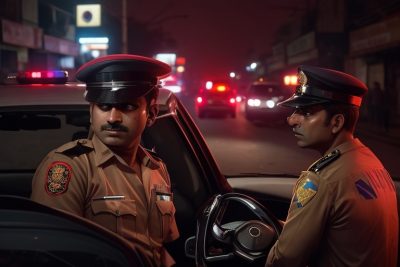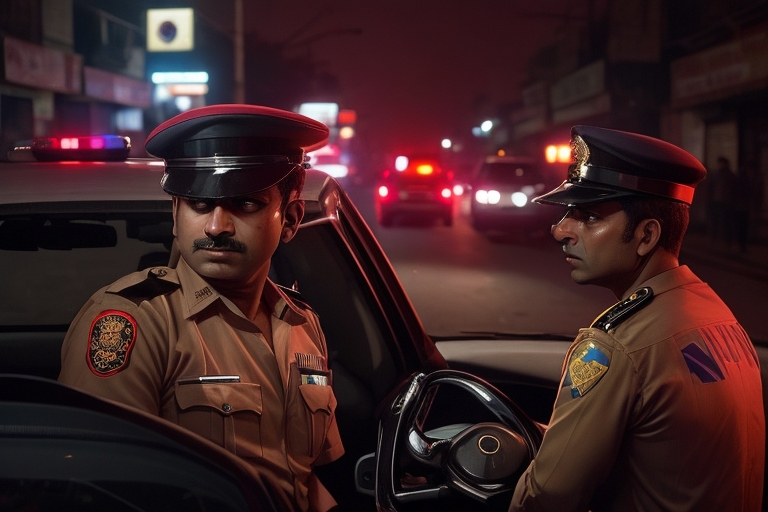 In the bustling city of Mumbai, the streets hold a silent adversary, lurking in the shadows of irresponsibility and danger. This adversary is none other than the act of drunk driving, a menace that threatens the safety and well-being of all who traverse the city’s roads.
In the bustling city of Mumbai, the streets hold a silent adversary, lurking in the shadows of irresponsibility and danger. This adversary is none other than the act of drunk driving, a menace that threatens the safety and well-being of all who traverse the city’s roads.
With severe consequences and hefty fines imposed by the Regional Transport Office, the penalties for this offense are not to be taken lightly. In this article, we delve into the realm of drink and drive penalties, alcohol level fines, and the overall repercussions of drunk driving in Mumbai.
Key Takeaways
- Drunk driving in Mumbai is considered a punishable offense under traffic police rules and can result in hefty fines and imprisonment.
- The penalty for drinking and driving in Mumbai is a fine of Rs. 3000 and the possibility of imprisonment for up to two years.
- If a person is injured or killed as a result of drunk driving, legal charges will be filed accordingly.
- The Blood Alcohol Content (BAC) limit for driving in India is 0.03% per 100ml of blood, and if caught with a higher BAC, penalties will be imposed accordingly.
Overview of Drink and Drive Penalties in Mumbai
The current discussion topic revolves around the overview of drink and drive penalties in Mumbai, focusing on the fines and consequences imposed for driving under the influence of alcohol.
Drunk driving is considered a punishable offense under traffic police rules, with hefty fines imposed by the Regional Transport Office (RTO). In Mumbai, the penalty for drinking and driving is a fine of Rs. 3000, and there is also a possibility of imprisonment for up to two years.
It is important to note that the penalties for drunk driving are specific to each case and cannot be generalized. Repeat offenses can lead to more severe punishments.
Additionally, if a person is injured or killed as a result of drunk driving, legal charges will be filed accordingly.
Legal Consequences of Drunk Driving in Mumbai
During a discussion on the legal consequences of drunk driving in Mumbai, it is crucial to understand the severity of fines and potential imprisonment that individuals may face for operating a vehicle under the influence of alcohol.
Drunk driving is considered a punishable offense under traffic police rules, and the penalties can be severe. In Mumbai, the penalty for drinking and driving is a fine of Rs. 3000, and there is a possibility of imprisonment for up to two years.
It is important to note that if a person is injured or killed as a result of drunk driving, legal charges will be filed accordingly. Repeat offenses can lead to even more severe punishments.
Therefore, it is essential for individuals to understand the consequences and refrain from driving under the influence to ensure the safety of themselves and others on the road.
Understanding Blood Alcohol Content (Bac) and Its Significance
Understanding Blood Alcohol Content (BAC) and its significance is crucial when discussing the implications of drunk driving. BAC is a measure of the amount of alcohol present in a person’s bloodstream.
In many countries, including India, there is a legal limit for BAC while driving. In India, the permissible BAC limit is 0.03% per 100ml of blood. Exceeding this limit can result in penalties and legal consequences.
It is important to note that the time taken by the body to process alcohol varies from person to person, so waiting for a certain period after drinking does not guarantee that one’s BAC will be within the safe limit. Therefore, it is always safer to avoid driving after consuming alcohol.
Breathalyzer tests are commonly used by traffic police to determine a person’s BAC. Cooperation with law enforcement officials is essential to ensure road safety and prevent drunk driving incidents.
The BAC Limit for Driving in Mumbai
To ensure road safety, it is important to abide by the prescribed BAC limit while driving in Mumbai and refrain from consuming alcohol above the specified threshold.
In Mumbai, the allowed Blood Alcohol Content (BAC) limit is 0.03% per 100ml of blood. Exceeding this limit can lead to penalties and legal consequences.
The Mumbai traffic police conduct routine checks and set up barricades at certain hotspots to address drunk driving. If stopped by a traffic police official, it is essential to cooperate and provide a breath sample if requested.
If the BAC is found to be above the limit, further processing at the nearest police station is required. It is crucial to understand that drunk driving is a punishable offense, and repeat offenses can lead to more severe punishments.
Therefore, it is essential to prioritize road safety and adhere to the prescribed BAC limit while driving in Mumbai.
Implications of Exceeding the BAC Limit While Driving
Exceeding the BAC limit while operating a vehicle can lead to severe legal consequences and potential penalties. Driving under the influence of alcohol is considered a serious offense and is punishable under traffic police rules.
In Mumbai, the penalty for drunk driving is a fine of Rs. 3000, along with the possibility of imprisonment for up to two years. These penalties can vary depending on the specific circumstances of the case and the severity of the offense. It is important to note that repeat offenses can result in more severe punishments.
To determine if a person is driving under the influence, traffic police officers often use breathalyzers to analyze breath samples for the presence of alcohol. Cooperation with law enforcement during routine checks and following proper procedures is essential to avoid legal consequences and ensure road safety.
Importance of Breathalyzer Testing for Drunk Driving Cases
Regularly using breathalyzer testing and consistently implementing it in drunk driving cases can significantly contribute to reducing the number of alcohol-related accidents on the roads.
Breathalyzer testing is a crucial tool that helps law enforcement authorities determine the blood alcohol content (BAC) of individuals suspected of driving under the influence. By accurately measuring the amount of alcohol in a person’s breath, breathalyzer tests provide objective evidence of impairment and help establish legal consequences.
Furthermore, the implementation of breathalyzer testing creates a strong deterrent effect, as individuals are aware that they can be easily detected and held accountable for their actions. This not only encourages responsible behavior but also raises awareness about the risks and dangers associated with drunk driving.
Ultimately, the widespread use of breathalyzer testing can play a vital role in preventing alcohol-related accidents and ensuring road safety for all.
Procedures for Dealing With Drunk Driving Offenses in Mumbai
One of the procedures for dealing with drunk driving offenses in Mumbai is conducting random breathalyzer tests at certain hotspots to detect individuals driving with a blood alcohol content above the legal limit. Mumbai traffic police set up barricades at these hotspots and conduct checks randomly to address the issue of drunk driving.
If a driver is stopped by a traffic police official, they are required to park their vehicle at the side and cooperate with the officer. The driver may be asked to provide a breath sample using a breathalyzer device. If the blood alcohol content is found to be above the legal limit, further processing at the nearest police station is required.
It is important for individuals to be aware of the consequences of drunk driving and to adhere to the traffic rules and regulations to ensure road safety.
Routine Traffic Checks and Measures to Combat Drunk Driving
The implementation of routine traffic checks and the utilization of effective measures are crucial in combating the issue of drunk driving.
Drunk driving poses a serious threat to road safety, with intoxicated drivers being responsible for a significant number of accidents and fatalities.
Routine traffic checks allow law enforcement agencies to identify and apprehend individuals who are driving under the influence of alcohol or drugs. These checks can be conducted at random locations and times, creating a deterrent effect and increasing the likelihood of catching offenders.
In addition to traffic checks, effective measures such as public awareness campaigns, stricter penalties, and mandatory alcohol education programs can also play a significant role in reducing drunk driving incidents.
Factors Considered in Determining Penalties for Drunk Driving
Various factors, such as the driver’s blood alcohol content, previous offenses, and the presence of injuries or fatalities, are taken into account when determining penalties for drunk driving. These factors play a crucial role in determining the severity of the punishment imposed on the offender.
The driver’s blood alcohol content (BAC) is a key factor in assessing their level of intoxication. The higher the BAC, the more severe the penalties are likely to be.
Previous offenses also play a significant role, as repeat offenders are often subjected to harsher punishments.
Additionally, if injuries or fatalities are involved in the drunk driving incident, the penalties are likely to be more severe.
It is important to consider these factors in order to ensure that appropriate penalties are imposed, promoting road safety and discouraging individuals from driving under the influence.
Repeat Offenses and Escalating Penalties in Mumbai
Repeat offenses for drunk driving in Mumbai often result in escalating penalties, discouraging individuals from engaging in such dangerous behavior.
The penalties for drunk driving in Mumbai are already severe, with fines up to Rs. 3000 and the possibility of imprisonment for up to two years. However, for individuals who continue to drive under the influence of alcohol, the consequences become more severe with each offense.
Repeat offenders may face higher fines, longer periods of imprisonment, and even the suspension or cancellation of their driving licenses. These escalating penalties send a strong message that drunk driving will not be tolerated and that the safety of the public is of utmost importance.
Conclusion
In conclusion, drunk driving in Mumbai is a serious offense with severe consequences. The penalties for this offense vary depending on the individual case, but can include hefty fines, imprisonment, and legal processing.
Blood Alcohol Content (BAC) is used to determine levels of intoxication, and exceeding the prescribed limit can result in penalties. It is important to cooperate with law enforcement officials during routine checks to avoid further legal consequences.
Overall, drunk driving poses significant risks and should be avoided at all costs.
